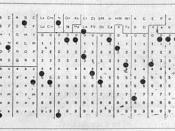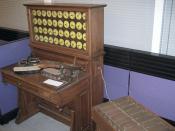For most of human history computing was irrelevant.
our ancestors noticed little things. They noticed on elk and one daffodil had something in common each was alone Later many societies apparently added a second number-two. Given five fingers on each hand, communicating quantity was not difficult if the numbers were small. It was easy to handle numbers up to ten. The use of written numbers is generally believed to have preceded the use of words for numbers. By the time agrarian societies formed, about eleven thousand years ago. An economic system was being formed, the beginnings of architecture and geometry existed. Each culture had develop its own, unique method of writing computations. The Roman system, which lasted in Britain until the Renaissance, kept math out of the hands of all but a small elite. Fortunately for that elite, they had the use of history's first digital computer, the abacus. A clay tablet in the British Museum dated 2300-1600 B.C.
and coming from Senkereh, in Babylonia, contains the squares of numbers up to twenty four. from stones to an abacus is a simple one. Simply take the pebbles, put them in an enclosed area in an ordered pattern of base five or ten, connect them with wires or hair, and you will not find it difficult to work out a method of adding and subtracting, and by repeating the steps, of multiplying and dividing. Greeks had abacuses by five hundred B.C. The abacus underwent several changes through out history. first and second century A.D., the Hindus had developed a nine-digit numbering system. It was not until much later that they added their most remarkable invention, the zero. By adding the zero to a decimal system, the Indians began a shining era of mathematics that lasted until around 1200 A.D. and led...


